A car cooling system plays a vital role in maintaining the optimal temperature of an engine, ensuring its smooth and efficient operation. With the combustion process generating a significant amount of heat, a car engine cooling system becomes crucial to dissipate the excess heat and prevent engine overheating. By regulating the engine’s temperature, the cooling system protects crucial components from damage, enhances fuel efficiency, and promotes overall vehicle performance.
You should know how a car cooking system works. This will help you ensure the longevity and reliability of your vehicle.
Main Components of Car Cooling System:
Here are the most important components of a car cooling system that work best in airflow management:
1. Radiator: The radiator system acts as a heat exchanger. It transfers heat from the coolant to the surrounding air. It consists of a series of tubes and cooling fins that allow efficient cooling by increasing the surface area for heat dissipation.
2. Water Pump: The water pump circulates coolant throughout the car engine cooler. It ensures a continuous flow of coolant between the engine and the radiator. It promotes heat transfer and prevents overheating.
3. Thermostat: The thermostat regulates the engine temperature by controlling the flow of coolant. It opens and closes based on the temperature. It allows coolant to flow to the radiator when the engine reaches a certain temperature. It restricts airflow management when the engine is cold.
4. Cooling Fans: Cooling fans are responsible for increasing airflow through the radiator when the vehicle is stationary or operating at low speeds. They help remove heat from the coolant and maintain a stable engine temperature.
5. Hoses and Pipes: Hoses and pipes connect various components of a car engine cooling system. They allow the coolant to flow between the radiator, water pump, engine, and other parts. They need to be in good condition to prevent leaks and ensure proper coolant circulation.
How an Air Cooling System in Engine Works:
A car cooling system regulates the engine’s temperature and prevents overheating. It achieves this through the circulation of coolant, a heat exchange process, and the crucial role of the radiator. Let’s have a look at the process in brief:
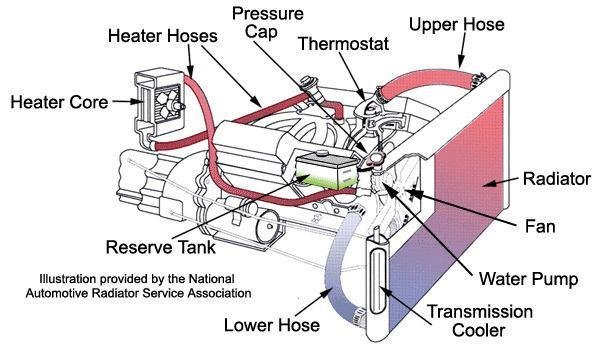
- Circulation of coolant: The car’s water pump circulates the coolant through the engine, absorbing heat and carrying it away from critical components. This continuous flow ensures that the coolant is constantly replenished and able to absorb more heat.
- Heat exchange process: As the heated coolant reaches the radiator, it passes through a network of small tubes that are cooled by airflow. This allows heat to be transferred from the coolant to the surrounding air, reducing the coolant’s temperature.
- Role of the radiator: The radiator is designed with fins and a large surface area to maximize heat dissipation. As the coolant passes through the radiator, it releases heat into the air, effectively cooling down before it returns to the engine for another cycle of heat absorption.
Together, these processes work in harmony to maintain the engine’s temperature within a safe operating range, ensuring optimal performance and preventing damage caused by excessive heat.
Signs of Cooling System Problems:
The cooling system plays a crucial role in maintaining the optimal temperature of an internal combustion engine. Here are three signs of cooling system problems:
Engine Overheating:
If the engine temperature rises beyond the normal operating range, it indicates a cooling system issue. This can be caused by a malfunctioning thermostat, a blocked radiator, a faulty water pump, or insufficient coolant.
Coolant Leaks:
Leaking coolant is a clear indicator of a cooling system problem. It can be identified by puddles of coolant under the vehicle or a drop in coolant levels. Leaks can occur from hoses, radiators, water pumps, or gaskets, and need to be addressed promptly.
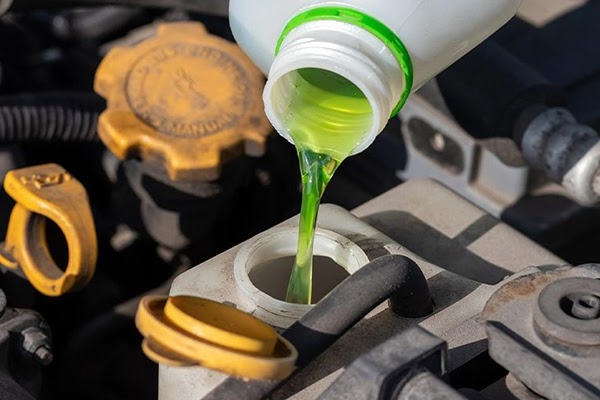
Strange Noises or Smells:
Unusual sounds, such as grinding or whining, coming from the engine compartment may indicate problems with the cooling system. Additionally, a sweet or pungent odor could suggest coolant leakage, which should be addressed to prevent engine damage.
Understanding these signs and promptly addressing any cooling system problems is crucial to prevent engine damage and ensure effective heat dissipation in both air-cooled and fan-cooled engines.
Importance of Regular Maintenance:
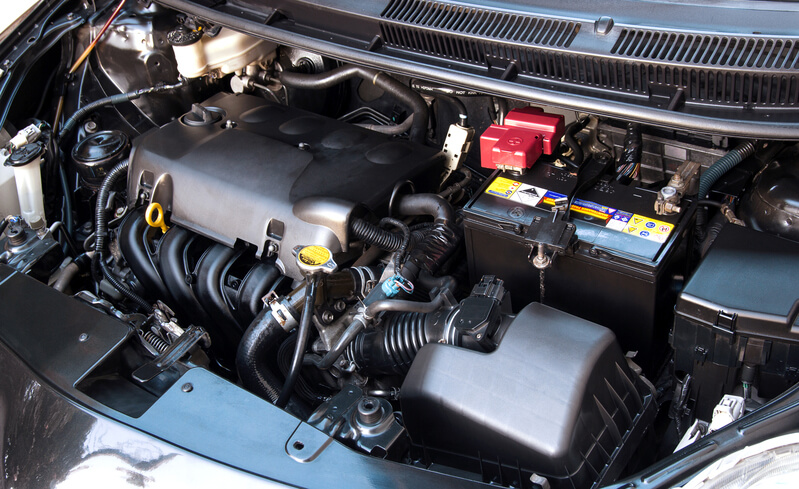
Regular maintenance is crucial for the proper functioning of the diesel engine cooling system and others. No matter whether the cooling system is air-cooled or fan-cooled, you need to follow a regular maintenance routine. Here’s the importance of regular maintenance:
- Preventing overheating and engine damage: Regular maintenance allows for the inspection and servicing of cooling system components like cooling ducts, radiators, and cooling fans. This helps identify and address potential issues before they escalate, preventing engine overheating and subsequent damage.
- Extending the lifespan of the cooling system: Routine maintenance, such as flushing and replacing coolant, checking for leaks, and inspecting hoses and belts, helps keep the cooling system in optimal condition. This extends its lifespan, ensuring efficient heat dissipation and preventing premature wear and tear.
These proactive approaches minimize the risk of breakdowns, improve performance, and enhance the overall reliability of the vehicle.
How to Maintain a Car Cooling System:
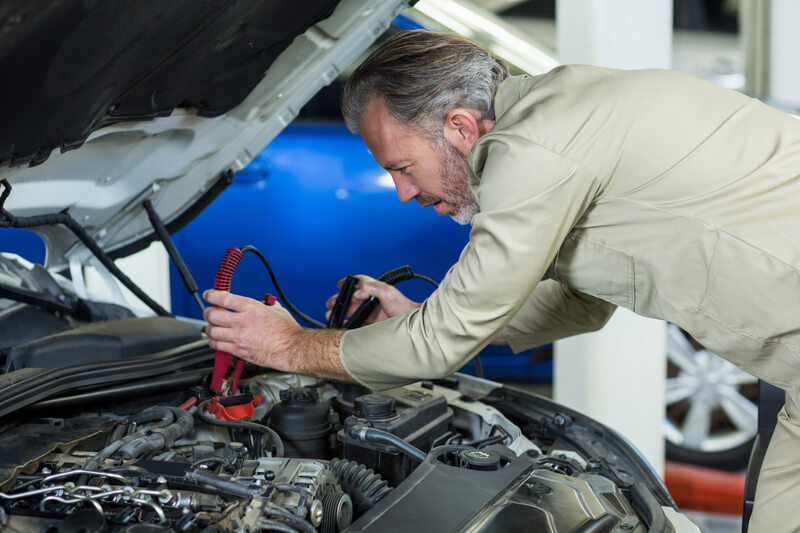
Proper maintenance of a car’s cooling system is essential to ensure optimal performance and prevent overheating. Here’s how to maintain a car cooling system:
- Checking coolant levels: Regularly check the coolant level in the coolant reservoir when the engine is cool. Top up if needed with the recommended coolant type and ensure the coolant is at the appropriate level.
- Inspecting hoses and pipes: Inspect the cooling system hoses and pipes for any signs of cracks, leaks, or damage. Replace any damaged components to prevent coolant leaks and ensure proper coolant circulation.
- Flushing and replacing coolant: Over time, coolant can become contaminated or lose its effectiveness. Flushing the cooling system and replacing the coolant at manufacturer-recommended intervals helps maintain proper heat transfer and corrosion protection.
- Cleaning the radiator and cooling fans: Remove any debris or dirt that may have accumulated on the radiator and cooling fans. Use a soft brush or compressed air to clean the fins and ensure proper airflow for efficient cooling.
By following these maintenance steps, you can effectively maintain your cooling system.
Troubleshooting Common Cooling System Issues:
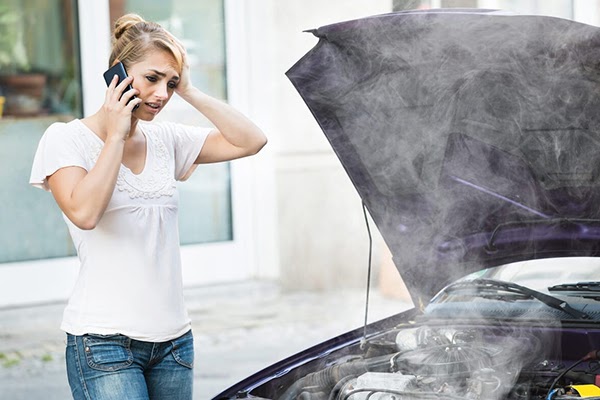
Cooling system issues can lead to engine overheating and potential damage. Here are common troubleshooting steps for cooling system problems:
Clogged Radiator:
A clogged radiator restricts proper coolant flow, leading to overheating. Check for debris, corrosion, or mineral deposits. Flushing the radiator or seeking professional cleaning can help resolve this issue.
Faulty Thermostat:
A malfunctioning thermostat can cause the engine to overheat or run cooler than normal. Test or replace the thermostat to ensure it opens and closes at the correct temperatures, allowing proper coolant flow.
Water Pump Failure:
The water pump circulates coolant throughout the engine. A faulty water pump can result in inadequate coolant flow, leading to overheating. Inspect for leaks or unusual noises and replace if necessary.
By troubleshooting these common cooling system issues, you can identify and resolve problems early on, ensuring optimal cooling system performance and preventing engine overheating or damage.
Tips for Cooling System Care:
Proper care of the cooling system is vital for a car’s performance and longevity. Here are some tips to ensure the health of your cooling system:
- Avoiding harsh driving conditions: Extreme heat, heavy towing, or prolonged idling can strain the cooling system. Minimize these conditions to reduce stress on the system and prevent overheating.
- Using the correct coolant: Always use the manufacturer-recommended coolant type and follow the correct coolant-to-water ratio. Using the wrong coolant can lead to inadequate heat transfer and potential damage to the cooling system.
- Regular inspections by a professional: Schedule regular maintenance and inspections with a qualified mechanic. They can identify potential issues, check for leaks, inspect hoses and belts, and perform necessary servicing to keep the cooling system in optimal condition.
By following these tips, you can enhance the reliability of your car’s cooling system, prevent overheating, and extend the lifespan of components.
Final thoughts,
Understanding how a car engine cooling system works and implementing proper maintenance practices are crucial for optimal vehicle performance. By effectively dissipating heat, regulating the engine temperature, and addressing potential issues promptly, you can ensure the longevity and reliability of your car’s cooling systems.
Image Source: Researchgate
FAQs:
Q: What are the two methods of engine cooling used?
A: The two primary methods of engine cooling are air cooling and liquid cooling. Air cooling is typically found in motorcycles and older vehicles. It relies on natural airflow to dissipate heat. Liquid cooling, more common in modern cars, uses a coolant circulated through the engine and a radiator to dissipate heat.
Q: What are the 3 different types of cooling systems used in engines?
A: The three different types of cooling systems used in engines are air cooling, liquid cooling, and hybrid cooling. Air cooling relies on natural airflow, liquid cooling uses a coolant circulated through the engine and a radiator, while hybrid cooling combines both methods, utilizing air and liquid cooling elements for optimal heat dissipation.
